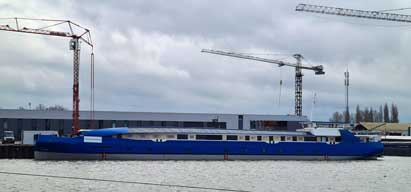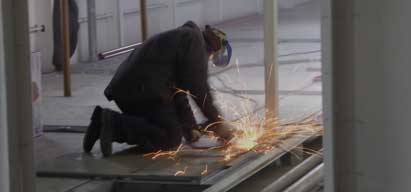- Topics
- Campaigning
- Careers
- Colleges
- Community
- Education and training
- Environment
- Equality
- Federation
- General secretary message
- Government
- Health and safety
- History
- Industrial
- International
- Law
- Members at work
- Nautilus news
- Nautilus partnerships
- Netherlands
- Open days
- Opinion
- Organising
- Podcasts from Nautilus
- Sponsored content
- Switzerland
- Technology
- Ukraine
- United Kingdom
- Welfare

Dutch educational institution STC Group is building a new ship called Ab Initio to lead the way in the modernisation of education and to ensure training for inland waterway navigation keeps pace with practice. Linde de Visser visited the Concordia Damen yard in Werkendam, where the outfitting is taking place
Inland shipping is innovating at a rapid pace. The future – as currently envisioned – consists of semi-manned ships, green sailing and, of course, ultramodern equipment.
'The ship will replace our old princesses,' says inland navigation lecturer Richard van der Straaten, referring to the current training ships which are more than 60 years old. Mr Van der Straaten himself had lessons on these ships, which at the time were named after Dutch princesses.
The new STC Group training vessel whose build he is overseeing will have space for 30 passengers. Students aged 12-16 years and middle level vocational students will take practical lessons onboard Ab Initio from September 2022. Higher vocational students will mainly use the vessel when conducting research in the innovative field lab onboard.
Bigger beds
However, it isn't time to begin yet. The first test sail will be in June and the ship will enter service in September. Students who are now in their third year will not be taught on Ab Initio, but they have enjoyed some very special study years involved in the construction of the ship since the start of the tender.
When their input was sought, students argued in favour of larger beds, because people are getting taller and the beds in the old ships were too short. As a result, larger beds will be placed on Ab Initio.
STC students such as maritime technology student Tom van Esch are also involved in the actual construction of the ship. Tom is enrolled on an internship at Concordia Damen and is often present on the vessel. While Nautilus was being shown around, he joined the tour and demonstrated his knowledge, telling us all about what we were looking at – where the electric motor will be, the bow thruster and the cabins. He proudly talked about the hydrogen cell and the generator. 'Participating in the realisation of Ab Initio has been a great opportunity for me to apply the theory in practice,' he said. 'During training I've learned a lot about shipbuilding, but it only really comes to life when you walk on the ship.'
Hull built in Serbia
Students were also involved in the building of the ship's hull in Serbia, but due to the pandemic, there was less time on offer for this than intended. However, Tom has been to Serbia and is now helping with the outfitting of the ship, learning a lot along the way. The thought that his fellow students will be able to use the ship for years to come is an exciting prospect for him. 'The fact that the ship is ultimately built for fellow students is the icing on the cake,' he says.


Solar panels and hydrogen propulsion
With the ship almost ready, the next phase is for students to learn to operate it. On Ab Initio they will work with solar panels and hydrogen propulsion – electric technology that is not yet widely used on commercial vessels.
'It is a new ship that complies with the laws and regulations, but also anticipates the future with green regulations,' says Mr Van der Straaten. The vessel – which is now ahead of current practice – also has a 'normal' diesel-electric engine to provide extra power needed to manoeuvre quickly in an emergency. It also ensures that students learn current practice. After all, the electric drive is in the near future, and will be encountered more and more often.
New learning facilities
To use the ship as optimally as possible for educational purposes, other learning facilities have also been built. For example, there will be an innovative field lab in front of the rear engine room. Students can view machines through a fireproof window and, by means of all kinds of sensors, constantly keep track of what exactly is happening. This way, all kinds of research questions related to the operation of the ship and its modern machines can be answered.
'We hope this will also enable us to answer questions from the business community,' says Esther Ouwens Nagell, senior communications advisor at STC Group.
Ab Initio is also prepared for the future. The ship has a modular construction, which means that engines, propeller, and other equipment can easily be replaced individually. This way the ship will be able to keep up with the times.
Tags
